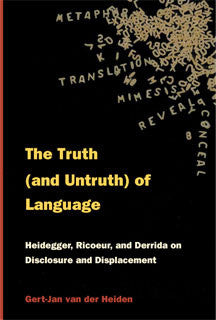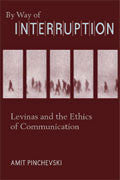The Truth (and Untruth) of Language: Heidegger, Ricoeur, and Derrida on Disclosure and Displacement
Gert-Jan van der Heiden $25.00300 pages | paper | 978-0-8207-0434-0
Reviews:
"Van der Heiden clearly locates the problem of language around its double ability to disclose the essence of things and displace the essence of things . . . No one has penetrated the Heidegger hinge between Ricoeur and Derrida as much as van der Heiden has." — Leonard Lawlor, Edwin Erie Sparks Professor of Philosophy, Penn State University
Book Information:
Throughout the history of philosophy, the truth of language has often been considered from the perspective of the distinction between language that serves the transparency and univocality to which philosophy strives and language that threatens this goal. Linguistic phenomena such as writing, metaphor, and poetic mimesis are often considered examples of the latter form, and as a result, treacherous to truth; they would exemplify the “seduction of language,” as Husserl beautifully called it. Against this background, it is remarkable that contemporary hermeneutics often inquires into the relation between truth and language by taking these seductive forms of language as a point of departure. Contemporary hermeneutics does so in order to provide a new understanding of truth and untruth in relation to language.
In this study, Gert-Jan van der Heiden shows that this hermeneutic understanding of the relation between truth, untruth, and language can be clarified by inquiring into the meaning of two notions: disclosure and displacement. Unconcealment and hiding, truth and untruth, disclosure and displacement are the key notions to understanding the various conceptions of language in contemporary approaches to hermeneutics in continental philosophy. By painting a picture of the different meanings of these concepts in the work of Heidegger, Ricoeur, and Derrida, illuminating the differences and affinities of their respective projects, he finds an original way of showing how these three thinkers mutually discuss the relation between truth and language.
The Truth (and Untruth) of Language also confirms Heidegger's continued influence in contemporary debates by tracing the influence of his account of the disclosure and displacement of language in the reigning schools of hermeneutical thought in continental philosophy. As a result, he offers a clear account of the comparison between hermeneutics and deconstruction by elucidating Ricoeur and Derrida's shared resource of Heidegger's project.
Author Information:
GERT-JAN VAN DER HEIDEN is assistant professor at the Faculty of Philosophy of the Radboud University Nijmegen (the Netherlands) and holds doctoral degrees in both mathematics and philosophy. He has previously published journal articles in Philosophy Today, Symposium, and Bijdragen. International Journal for Philosophy and Theology. He is a member of the Young Academy of the Royal Netherlands Academy for Arts and Sciences (KNAW).







